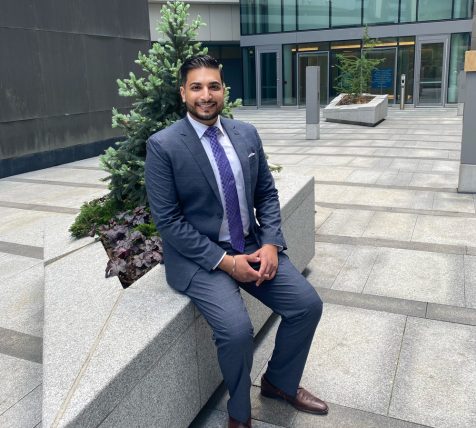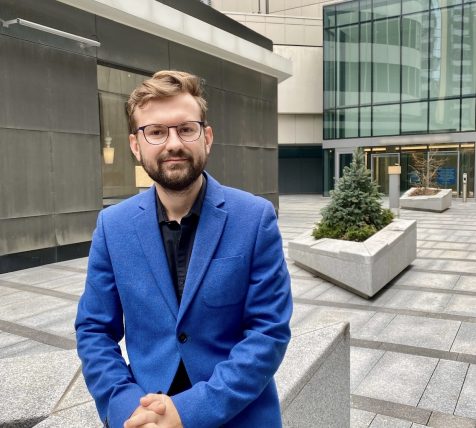Nick Hawkins
2014/2015
Nick Hawkins spends his days working to protect investors. As legal counsel at the Ontario Securities Commission (OSC) he’s helping regulate investment funds in the province.
About Nick
Nick Hawkins spends his days working to protect investors. As legal counsel at the Ontario Securities Commission (OSC) he’s helping regulate investment funds in the province. However, law was never his first career choice despite being born into a big family of lawyers. At the age of six, he cooked up the idea of becoming a chicken farmer. He didn’t know it at the time, but his early entrepreneurial aspirations and his spirit of integrity would eventually land him in a legal position that would allow him to combine his passions of law, politics and business.
Where did you earn your law degree?
French Common Law Program, Faculty of Common Law, University of Ottawa
Why law? What inspired your legal aspirations?
I come from a family of lawyers; three of my four grandparents were lawyers, both my parents are lawyers, one of my brothers is a lawyer, and the other is finishing his law degree at McGill. As my brothers and I were growing up, we would constantly be pleading “for our rights” as we saw them (going to McDonald’s, being allowed to play games on the computer, staying up late). You can imagine the adversarial environment that existed! We always wanted to be “right”. Law seemed like a natural fit.
Tell me about your childhood?
We were raised to have the courage of our convictions. I remember that I fought the idea of becoming a lawyer. I was an entrepreneur at heart. From the ages of 6 to 10, I wanted to be a chicken farmer. This idea terrified my grandmother. But I was fascinated with the idea that chickens could lay eggs and that you could eat them. From a business point of view, I thought that this was a great idea. When I was in undergrad, I participated in an exchange in Spain and I thought I wanted to work in foreign affairs. However, law was a big deal in my household. My mom is a corporate lawyer. My dad is a law professor and when I was younger I would sit in on his classes. My paternal grandfather had a general practice and was a magistrate in a Manitoba prairie town. My maternal grandmother was called to the bar in Belgium but did not practice for long owing to the outbreak of the Second World War. We’re a close family and I would often hear about the challenges about working for a big firm around the dinner table.
What kind of law do you currently practise?
I practise securities law as Legal Counsel in the Investment Funds & Structured Products Branch at the Ontario Securities Commission (the OSC). Our group at the OSC regulates investment funds and structured products (mutual funds, exchange traded funds, etc.). I like the business side of things – the psychology of what we choose to invest in, where we spend our money, how this affects the market and how that market is regulated. There are three strong sides to me – legal, political, and business. As a regulator these three sides come together and there’s a natural synergy.
What is a typical day at work/office like for you?
On a typical day I review filings from investment funds. These filings mostly consist of mutual fund or exchange traded fund prospectuses and other disclosure documents that funds are required to prepare. Most people don’t realize how much information must be disclosed by an investment fund before it can be sold to the public. When an investor purchases a mutual fund, a Fund Facts document must be provided to them at the point of sale outlining the investment objectives, investment strategies and other features of the mutual fund. A prospectus is also filed and available for investors to read. I’m the person who reviews these documents before the mutual fund can sell its securities to the public. When there are issues with fillings, I write a comment letter to the investment fund’s legal counsel in order to resolve the outstanding issues.
In certain cases, investment funds seek exemptions from the rules that are applicable to them. I review these applications and provide a recommendation to a Commissioner or Director of the Ontario Securities Commission, who signs the order granting the exemption sought.
I also work on policy projects. One of the responsibilities of the OSC is to set regulations for investment funds and structured products. I assist in drafting new rules or modifying existing ones. This involves publishing proposed rules for public comment, discussing the proposed rules with various stakeholders, and publishing final rules to be followed by investment funds.
What is the best part of your career?
The best part of my career is being able to work with highly dedicated and intelligent people in a sector that is really interesting. Most people tell me that what I do is really boring but I love it! Unlike many lawyers, I am not arguing a client’s position or trying to defend a certain position. We hear arguments from the various stakeholders and try to come to up with creative solutions to solve concerns while ensuring investors are properly protected.
What is your least favourite part of the job?
As my dad says, if you liked every part of it, you wouldn’t be getting paid to do it. Work is work: deadlines need to be met, documents have to be drafted and prospectuses have to be reviewed. Not every filing that we review or issue that we tackle is front page news. There is a lot of work going on behind the scenes, some of it very interesting, some of it less so.
What legal case had a strong impact on you and why?
Every court decision is important, but one stands out for the impact that it had on me. One day during my securities class, a then Vice Chair of the OSC lectured on the application of the OSC’s public interest jurisdiction in the Canadian Tire Decision vs. the Magna Decision. Unlike most law school lectures I attended, I found this one incredibly interesting and found myself (for once) being “that kid” constantly raising my hand in class. If anything, it confirmed my interest in the financial markets and in securities law.
Where did you complete your LPP work placement?
I completed my work placement at the OSC. At that time, I was working in the Corporate Finance Branch as a member of the team introducing and reforming prospectus exemptions in Ontario with the goal of assisting small and medium sized businesses to raise capital.
Describe a particularly significant experience during the training component of the LPP
My weakest two grades in law school were in criminal law and evidence. As criminal is one of the areas of law covered by the LLP program (students are required to represent an individual accused of a crime though all stages of his case), I was worried about how well I would do in that portion of the LLP program. To my surprise, I quite enjoyed representing my client. When it came to pleading in front of a “judge” (the lawyer who was evaluating us) during the in-person portion of the program, I felt at ease in the setting. Once I had completed my pleading, the lawyer handed me her card and said I should contact her when it would be time to find a placement. While my future did not rest in criminal law, the experience shows that you can do well in an area of law in a ‘real world’ setting even if you struggled with it in the academic context.
Describe a particularly memorable experience during the work placement component of the LPP
I remember gaining confidence as the work placement went on and gaining enough knowledge to be able to contribute substantively to the work of the group as opposed to being a glorified spell checker. Of course, the most rewarding part of the placement was finding out that my contract was going to be extended after being called to the bar!
Describe some of the more particularly helpful tools or skills you acquired during the LPP
Law school is very academic (by definition). The LPP provides a much more practical education to allow a lawyer to “hit the ground running” in a broad range of legal fields.
Words of advice can you offer future LPP candidates
The LPP offers you a chance to “break the mold” of the traditional articling experience. During law school, there is an incredible amount of pressure to get a job at a big firm. The process that students must go through to get those jobs is tremendously onerous. It leaves students stressing over their grades, what they should include in their resume, what courses they “should” take to be attractive candidates for the firms, what to wear to interviews, what questions to ask their interviewers, etc. (the list is endless). Law school career centers are largely focused on assisting large law firms in their hiring process. I will never forget being told on the first day of law school frosh week that if we were interested in a summer position in Intellectual Property Law at a big firm, we should contact career services that week because the applications were to be sent in shortly. This was not a process I wanted to be a part of. During my time in law school, I never applied for a single OCI or law firm position. I simply had no interest in being part of that rat race. The LPP lets you chart your own path. The program gives you exposure to many varied areas of the law. You can leverage your connections and create your own experience from there.
Anything else you'd like to share about the LPP and your experience
I would not be where I am today had I not taken the LPP or had people at the OSC not given me an opportunity. I am not sure if I gone through the regular hiring process, that I would have been hired by the OSC (my top choice career-wise). When I approached the OSC about doing my placement here, the OSC needed personnel for a special initiative (the reform of the exempt market in Ontario). I was available for 4 months and more than eager to join the team. It was through this initial 4-month period that I was able to demonstrate my abilities. This led to my 4-month contract being renewed 3 times and ultimately to me being hired in the Investment Funds & Structured Products Branch on a full-time basis.






















